European elections 2019: Love and hate in EU after economic rescues
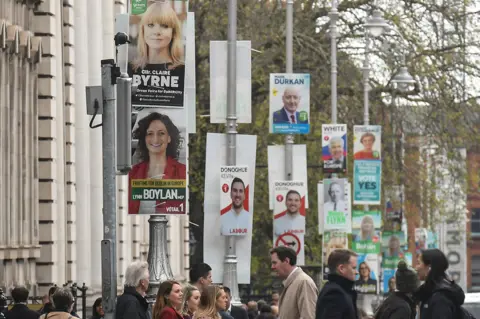 Getty Images
Getty ImagesAirbrushed and hair-brushed, the faces of dozens of European election candidates smile down from posters which seem to be fixed to every lamp-post on every highway in Ireland.
They come from every point on Ireland's idiosyncratic political spectrum, from the traditional centre-right powerhouses of Fine Gael and Fianna Fáil, through the republicans of Sinn Féin, to Labour and the Greens on the left.
But one thing unites them all: an enthusiasm for the EU and a belief that its institutions, while not perfect, have been good for Ireland.
Such enthusiasm is hard to find in Greece which, like Ireland, received a massive EU financial rescue during the eurozone debt crisis.
Support from EU 'family'
Maria Walsh is one of the more colourful candidates in the campaign, running for the governing party Fine Gael.
Maria has held office before in a sense - she was the first gay woman to win the previously rather twee Rose of Tralee pageant - but she is a newcomer to this kind of contest.
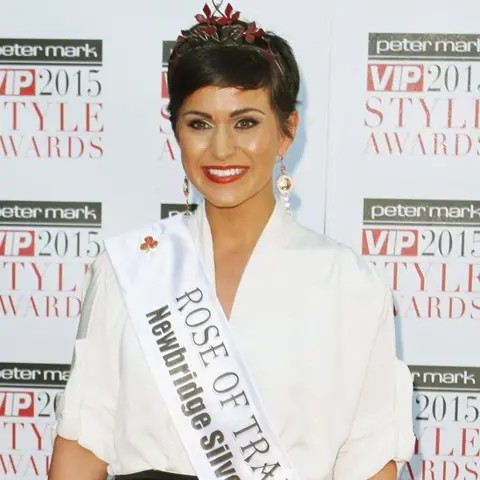 Getty Images
Getty ImagesShe has a knack for making news, which should come in handy, though. Her comments about her high scoring on the rifle range as a reservist in the Irish Defence Forces made national headlines.
She offers this thoughtful take on Ireland's relationship with the EU.
"We appreciate the fact that in our hard times something much bigger than us, a family, a union had driven us through," she said, "and it's great now that we're in a position where we're contributing, we're not just receiving, and it's a two-way street."
Read more on the European elections:
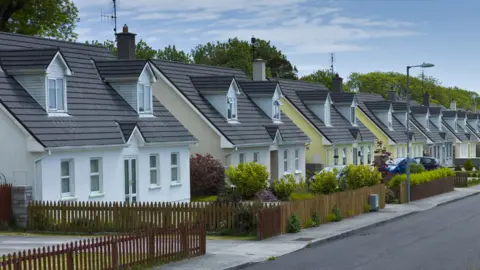 Getty Images
Getty ImagesA recent survey - conducted by the EU itself, incidentally - put Ireland at the top of a list of member states where voters were asked if membership had on the whole been beneficial.
A startling 93% of Irish voters agreed with that proposition - a good reason to compare attitudes here with those in Greece, a country close to the bottom of the list.
Why Irish views are so different from the Greeks'
In part, of course, attitudes in both countries are based on a straightforward, financial calculation.
Irish writer Kevin Connolly (no relation) calls Ireland's vote to join what was then the EEC back in the early 1970s "the best decision this country ever made", in part because EU funding built a new road infrastructure in Ireland, the neural wiring of a strong modern economy.
Add to that Brussels' unwavering diplomatic support for Ireland against the UK over Brexit and you have a compelling case for loving the EU institutions.
In Greece there is deep and widespread resentment over the EU's role in bailing out the national economy after the financial crisis. The tight strings attached meant fewer jobs and smaller pensions.
The fact that growth has now returned to Greece, arguably as a result of that discipline, hasn't made Brussels any more popular.
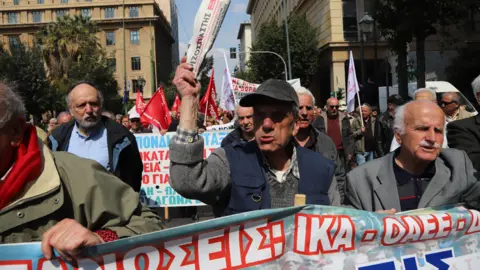 Getty Images
Getty ImagesIn the same survey where 93% of the Irish expressed enthusiasm for all things EU the figure for Greece was 54%. Only Italy polled lower.
That does suggest that voter perception of the EU is based not on big European themes, like the rise of populism, but rather on how the country has fared financially at the hands of the European institutions.
Brussels has few critics more articulate than the one-time speaker of the Greek parliament, Zoe Konstantopoulou.
She is a former ally of leftist Prime Minister Alexis Tsipras, who split with him because she says he has become a puppet of Brussels, failing to stand up for the Greek people.
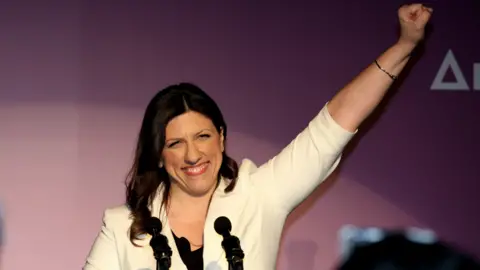 Getty Images
Getty ImagesMs Konstantopoulou's new party Course of Freedom is anti-EU, an institution she describes as a "monstrous construction which we need to take down".
Asked how she thinks the European Parliament elections will play out in Greece, she says simply: "I expect to see both the anger and rejection of the EU expressed in the polls.
"There is no democracy in the European Union, and what the EU did to my people and my country, this is not a union to belong to."
A test for European democracy
Course of Freedom also wants Greece to demand around €250-350bn (£216bn-302bn) in war reparations from Germany, a campaign which, if it were to catch on in other countries like Poland, could start to pick at the very threads that hold the EU together.
Every European Parliament election campaign is to some extent a test of the popularity and relevance of the institution itself.
Turnout has fallen at every poll, from around 62% in 1979 to around 42% last time around, in 2014.
The much talked-about rise of populist parties might produce a spike this time - both of people wanting to support them and people wanting to vote against them.
But for a snapshot of the health of European democracy on election night you could do worse than to check the figures from Ireland and from Greece, to see how the very different experiences of those two countries are reflected in the polls.
